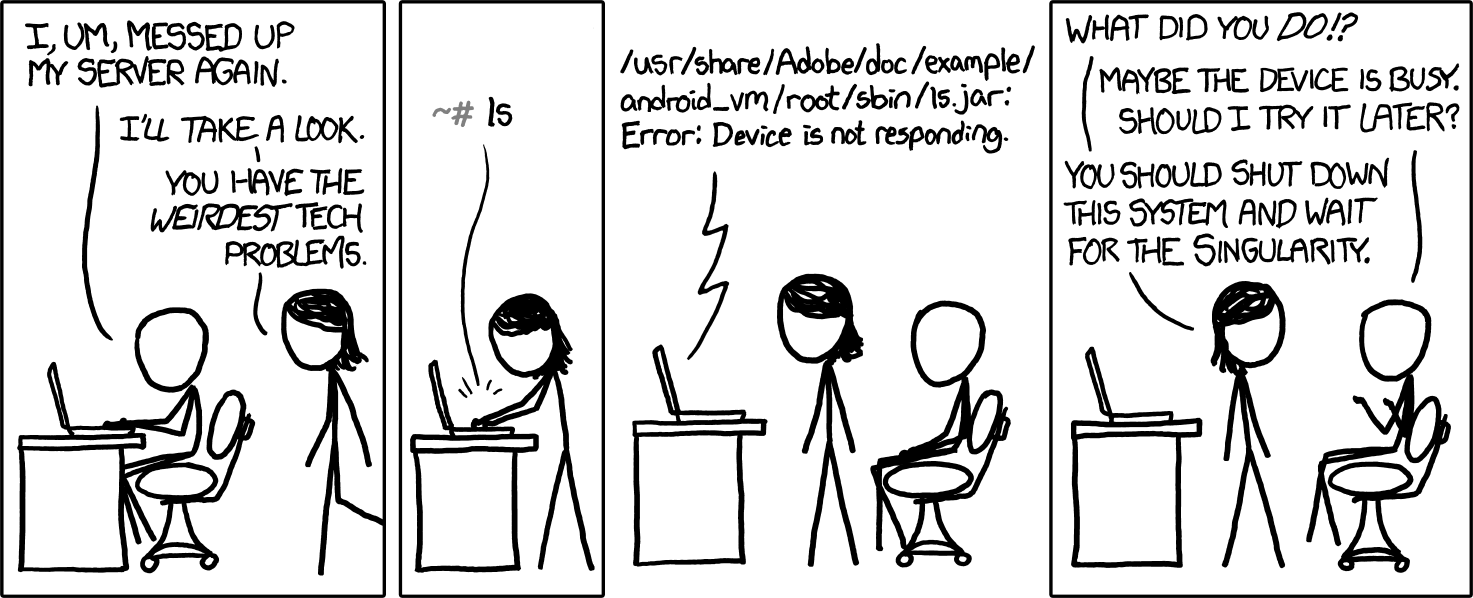… but
cdis a built-in-1 accuracy point ( ◞ ﹏ ◟)
linux 4.5-rc5 had efivarfs fixed to prevent “rm -rf /” bricking uefi motherboards – so maybe someone can try it out? :]
This is one of the reasons I’ve disabled uefi by default with the
noefikernel parameter, the other reason being the LogoFAIL exploit: https://wiki.archlinux.org/title/Unified_Extensible_Firmware_Interface#Disable_UEFI_variable_access
It would be pretty useless if cd was a child process that changed its own directory, only to return to bash and be back where you started.
Having been in this situation (the only binary I could use was
bash, althoughcdwas a bash builtin for me),echo *is your friend. Even better is something like this:get_path_type() { local item item="$1" [[ -z "$item" ]] && { echo 'wrong arg count passed to get_path_type'; return 1; } if [[ -d "$item" ]]; then echo 'dir' elif [[ -f "$item" ]]; then echo 'file' elif [[ -h "$item" ]]; then echo 'link' # not accurate, but symlink is too long else echo '????' fi } print_path_listing() { local path path_type path="$1" [[ -z "$path" ]] && { echo 'wrong arg count passed to print_path_listing'; return 1; } path_type="$(get_path_type "$path")" printf '%s\t%s\n' "$path_type" "$path" } ls() { local path paths item symlink_regex paths=("$@") if ((${#paths[@]} == 0)); then paths=("$(pwd)") fi shopt -s dotglob for path in "${paths[@]}"; do if [[ -d "$path" ]]; then printf '%s\n' "$path" for item in "$path"/*; do print_path_listing "$item" done elif [[ -e "$path" ]]; then print_path_listing "$path" printf '\n' fi done }This is recreated from memory and will likely have several nasty bugs. I also wrote it and quickly tested it entirely on my phone which was a bit painful. It should be pure bash, so it’ll work in this type of situation.
EDIT: I’m bored and sleep deprived and wanted to do something, hence this nonsense. I’ve taken the joke entirely too seriously.
was a bit painful
Well that’s an understatement
My pain tolerance for shitty input methods has been permanently warped after experiencing psychic damage from using Teamviewer to connect to a system over a very flaky HughesNet satellite link. I was working for a vendor that supplied a hardware networking box to a stupid retail company that sells food and shit. I just wanted to ssh to our boxen on a specific network so I could troubleshoot something, but the only way I could get to it was via putty installed on an ancient Windows XP desktop on the same network as our box that could only be accessed with Teamviewer. My favorite part of that was that the locale or something was fucked up, so my qwerty keyboard inputs were, like, fucking transformed into azerty somehow?? The Windows desktop was locked down and monitored to a tremendous degree, so I couldn’t change anything. The resolution was terrible, the latency was over a second, and half of my keyboard inputs turned into gibberish on the other side.
Oh, and I was onsite at that same company’s HQ doing a sales engineering call while I was trying to figure out what was wrong. I spent 5 days sitting in spare offices with shitty chairs, away from my family, living that fucking nightmare before I finally figured out what was wrong. God damn, what a fucking mess that was. For anyone reading this, NEVER WORK FOR GROCERY/DRUG STORE IT. They are worse than fucking banks in some ways. Fuck.
EDIT: also, I asked ‘why Teamviewer’ and the answer was always shrugs. This was before the big TeamViewer security incidents, so maybe they thought it was more secure? Like, at least they didn’t expose RDP on the internet…
Yeah, suddenly coding on a phone doesn’t seem so bad
It very definitely was 😅 The way that company used the satellite network was cool, don’t get me wrong. They would use it to push content out to all their stores with multicast which was really efficient with bandwidth. I loved it for that, but I hated interacting with it over unicast in any way, shape, or form. Horses for courses, as they say.

Obligatory XKCD
Hmmm command not found, let me just try the same command a couple more times, this time it will work right?
In IT teaching users to actually read and understand errors is always an uphill battle.
Tbh I’d try it multiple times too, just because the concept of cd not being there is horrifying and cannot possibly be the case
Very true, I would do the same and feel my stomach drop farther each time.
I learned early in my software engineering career these two beautiful rules of debugging:
- Read all of the words
- Believe them
Unless you were the one writing the program and its error messages - then check, that you didn’t mess up there…
Until you write a compiler error in some deeply templated C++ code, in which case just reading every word takes all day
/s but not too much
Addendum to 2: never believe that what they say is relevant to what’s actually happening here. You have a lot of faith that the people writing error messages knew what they were doing!
Where is the Windows ‘help’ button, did you try that?
You see they all different one use / the other use - and ~
/S
Reminds me this great story from a different era:
That was a beautiful read, cheers!
If you enjoyed it, I’ve collected a couple of others:
The final line of the one about the VAX machine is so perfect
THANKS!!! I have it bookmarked forever now!
I lost access to it. Thank you for bringing it back to me! Yay!..
No problem, just tab complete your way around the filesystem.
“gg” - dd
I am immune to /dev/sda for I only have nvme
I love the nvme partition naming. Looking at you nvme1n1p3
/dev/nvme1s²2s²2p⁶3s²3p⁶4s²3d¹⁰4p²
What do you mean? The nvme device label convention is far easier to screw up IMO. At least on my system the first drive would be labeled “nvme0n1”, second “nvme1n1”, etc and partitions get an additional suffix like “nvme0n1p1”.
I am far more likely to screw that up compared to “sda” vs “sdb”. Especially since I noticed that if I have both my internal and external SSDs hooked up at boot time their number gets assigned on a seemingly random basis.
Eh? Idk if I agree. My original comment was entirely a joke based on the fact that the literal argument of=/dev/sda has no affect on my system but to address your actual point. I personally don’t find nvme naming any more confusing than SCSI. /dev/nvme0n1 is only one char away from /dev/nvme1n1 just like sda vs sdb. Additionally if you understand how the kernel comes up with those names they make a lot of sense. The first number is the controller, the second is the namespace or drive attached to that controller, the 3rd if present is the partition on the given drive. It is entirely possible to have a controller with more than one namespace. That aside aside…I think there is a genuine benefit to be argued for having USB drives, which are SCSI and fall into sdX naming separate from system drives as I dd far more USB media than system media. Making it a lot harder to screw my system up when trying to poke a flash drive.
That might make it even more dangerous, because you get used to flash to usb sticks on “/dev/sda”. And when you then use a device with a built-in sata drive, you might forget checking in a hurry.
Happened to me a once or twice. I am now only using bmap tools for this.
I see girls last tour, I upvote.
You should all just use an immutable distro. Problemo solved-o.
/s
Empty
$PATH.This isn’t programming, just someone who sucks at bash.
How else are you going to open your files in nano to do the programming on the prod server?
what’s a nano?
guix rollbackI remember being so scared the first time I screwed up my
$PATHbah, https://github.com/fosslinux/live-bootstrap
you don’t even need a terminal or a prompt to bootstrap every tool you need.











